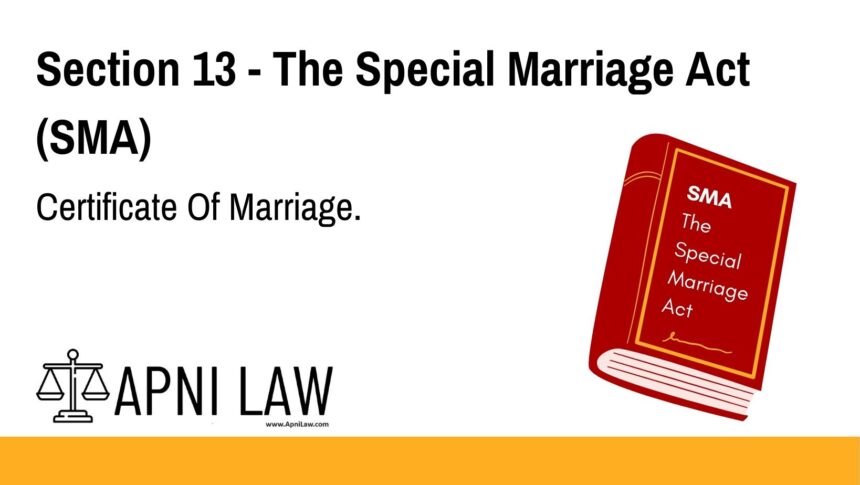Code: Section 13
(1) When the marriage has been solemnized, the Marriage Officer shall enter a certificate thereof in the form specified in the Fourth Schedule in a book to be kept by him for that purpose and to be called the Marriage Certificate Book and such certificate shall be signed by the parties to the marriage and the three witnesses.
(2) On a certificate being entered in the Marriage Certificate Book by the Marriage Officer, the certificate shall be deemed to be conclusive evidence of the fact that a marriage under this Act has been solemnized and that all formalities respecting the signatures of witnesses have been complied with.
Explanation of Section 13 of the Special Marriage Act
Section 13 of the Special Marriage Act, 1954 lays down the official process for registering a marriage after it has been solemnized. It provides for the issuance of a formal certificate of marriage that serves as conclusive legal proof of the marriage under the Act.
Key Provisions:
- Once the marriage is solemnized under Section 12, the Marriage Officer must record the marriage in the prescribed format as per the Fourth Schedule.
- The entry is made in a designated register called the “Marriage Certificate Book.”
- The certificate must be signed by:
- Both parties to the marriage
- The three witnesses present at the solemnization
- Once this entry is made, the certificate serves as conclusive legal evidence:
- That a marriage under this Act has taken place
- That all procedural and signature formalities have been duly complied with
This process ensures legal validity and recognition of the marriage for all administrative and legal purposes, including applying for passports, visas, inheritance claims, etc.
Illustration
Example 1: Certificate Entry After Marriage
After solemnizing their marriage under Section 12, Priya and Armaan proceed to sign the Marriage Certificate along with their three witnesses. The Marriage Officer enters the certificate in the Marriage Certificate Book. This entry now serves as undeniable proof of their marriage.
Example 2: Legal Value of the Certificate
Ravi and Zara, married under the Special Marriage Act, are asked to prove their marriage during an immigration process. The certificate issued and entered by the Marriage Officer under Section 13 is accepted by the authorities as conclusive evidence of their legal marital status.
Common Questions and Answers on Section 13 SMA
1. What is the Marriage Certificate Book?
It is the official register maintained by the Marriage Officer where all marriages solemnized under the Act are recorded in the format specified in the Fourth Schedule.
2. Who signs the marriage certificate?
The certificate must be signed by the two parties to the marriage and the three witnesses who were present during the solemnization.
3. Is the marriage certificate issued under Section 13 legally valid across India?
Yes, the certificate is a conclusive legal document that is valid across India and recognized for all official and legal purposes.
4. Can the marriage be challenged if the certificate is issued?
Once the certificate is entered and signed as per the Act, it is considered conclusive evidence of the marriage. However, it may still be challenged in court under exceptional circumstances, such as fraud or misrepresentation.
5. Is the certificate mandatory for legal recognition of marriage?
Yes, under the Special Marriage Act, the entry and signing of the certificate as per Section 13 are essential for formal and legal recognition of the marriage.
Conclusion
Section 13 of the Special Marriage Act ensures that every marriage solemnized under this law is properly documented and legally recognized. The certificate entered in the Marriage Certificate Book serves as indisputable proof of marriage, safeguarding the rights of both spouses. This provision emphasizes transparency, accountability, and legal certainty for couples opting for a civil marriage.
For more detailed breakdowns of family and marriage laws in India, visit ApniLaw today!








